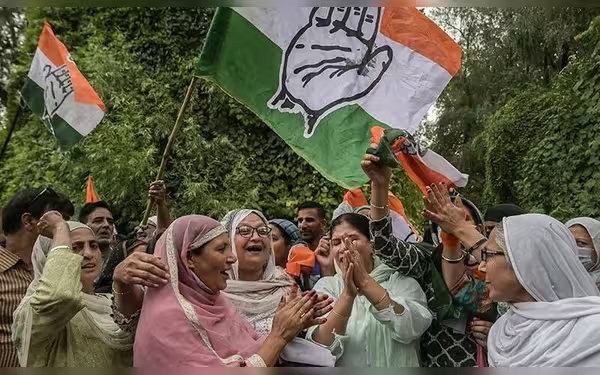Saturday, November 16, 2024 04:22 PM
IIOJK Elects First Opposition-Led Government Since Direct Indian Control
- First government elected since India's direct control in IIOJK.
- National Conference and Congress alliance wins 48 seats.
- Election reflects local populace's desire for change.
 Image Credits: tribune.com.pk
Image Credits: tribune.com.pkIIOJK elects its first opposition-led government since direct Indian control, marking a significant political shift in the region.
The political landscape in the Indian-administered region of Jammu and Kashmir (IIOJK) has witnessed a significant shift as the region has elected its first government since coming under direct control of India. This election marks a pivotal moment in the history of IIOJK, where the opposition parties have successfully formed a government, signaling a potential change in governance and policy direction.
As the results were announced, an alliance between the National Conference (NC) and the Congress parties emerged victorious, capturing the hearts of many supporters who took to the streets in celebration. According to figures released by the Election Commission, the NC and Congress secured a total of 48 out of 90 seats in the regional assembly. In contrast, Prime Minister Narendra Modi's Bharatiya Janata Party (BJP) trailed significantly, winning only 29 seats.
This election is particularly noteworthy as it is the first since the Indian government revoked the special status of Jammu and Kashmir in August 2019, a move that led to widespread unrest and a clampdown on civil liberties in the region. The formation of a government by the opposition parties could indicate a shift towards addressing the concerns of the local populace, who have long felt marginalized in the political process.
The victory of the NC and Congress alliance is seen as a rejection of the BJP's policies in the region, which many believe have exacerbated tensions and hindered development. The new government will face the challenge of uniting a diverse population and addressing pressing issues such as unemployment, infrastructure development, and restoring peace.
As the newly elected representatives prepare to take office, the people of IIOJK are hopeful for a government that prioritizes their needs and aspirations. The coming months will be crucial in determining whether this new administration can foster a sense of stability and progress in a region that has seen its fair share of turmoil.
The election results in IIOJK not only reflect the will of the people but also set the stage for a new chapter in the region's governance. It remains to be seen how the opposition-led government will navigate the complex political landscape and whether it can deliver on its promises to the citizens. The eyes of the nation and the world will undoubtedly be watching closely as IIOJK embarks on this new journey.













